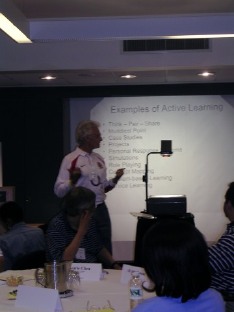Headed by Dr. Robin Jordan.
The program in physics education is concerned principally with investigating and developing methods of improving the teaching and learning of physics. Currently, we identify three main thrusts, (a) introduction and development of active-learning pedagogies in the classroom, (b) the development of methods for delivering general physics courses - including course materials and laboratories - on-line, and (c) methods for developing discriminating multiple-choice tests.
Florida Atlantic University is one of almost 100 institutions participating in The Carnegie Academy for the Scholarship of Teaching and Learning (CASTL) Campus Program Leadership Clusters, which is dedicated to cultivating and sharing experience and expertise in the scholarship of teaching and learning. The aim is the introduction and development of active-learning pedagogies for the classroom. The Scholarly Inquiry about Active Pedagogies cluster brings together faculty members of Clayton State University, Florida Atlantic University, Indiana State University, Texas Tech University, and University of Massachusetts - Lowell committed to the scholarship of teaching and learning.

The cluster focuses on promoting the use of active pedagogies and researching the effectiveness of these pedagogies. We are working to develop and study various curricular models that incorporate appropriate technologies, assessments, and pedagogies that promote deep learning and critical thinking. Pedagogies being explored include:
Assessments have been conducted at each campus and results have been presented and disseminated through printed and electronic publications.
At FAU we are concentrating on the introduction, development and assessment of electronic response systems in the classrooms. Recent highlights include an exceedingly well received interactive workshop run by the Active Pedagogies Cluster entitled "Incorporating Active Learning into Courses and Program; A Scholarly Dialogue" and co-chairing a roundtable discussion about classroom response systems at the 2005 Summer Academy, Institute for Higher Education Policy. A more detailed description of some of the activities being carried out at FAU can be found here.
We are collaborating with Dr. Bassem Alhalbi (Department of Computer Science and Engineering, FAU) on a pilot project to design, develop and evaluate eight, on-line, General Physics lab exercises that students can access from any location, at any time, over the Internet. Each exercise will not only require the student to make measurements using authentic and controllable on-line experiments, but also to respond to a number of challenging questions at appropriate points, to create a true learning experience.
There are a number of features that make this and exciting proposal. For instance:
Our goal is to develop fully integrated, on-line and pedagogically sound General Physics courses that consist of course work - distributed by DVD or on-line audio/visual synchronized lectures - and lab exercises in motion, mechanics, rotational motion, heat, electricity, magnetism, optics, etc. It provides a real challenge and, as far as we are aware, no such integrated courses have been developed.
Many of the large introductory classes use multiple-choice tests to determine students' achievement and mastery of the course material. However, multiple-choice tests have, at best, a mixed reputation among faculty. The two most important characteristics of an achievement test are its validity and reliability. The validity is determined by how well the test samples the range of knowledge, skills and abilities acquired by students as demanded by the course. The reliability depends on grading consistency and discrimination between students of differing performance levels.
Our aim in this project is to investigate and quantify the most important factors in creating valid and discriminating multiple-choice tests. By carrying out an item analysis on recent tests in physics and physical science classes we are attempting to determine what constitutes "good" questions, i.e., ones that not only sample creative and critical thinking skills at various levels but discriminate reliably between students who have a clear understanding of the course material and those who do not. Initial results indicate that various tasks, such as memorization and recall, unit conversion, algebraic manipulation. etc. can be given a numeric level of difficulty, so that any question that involves a number of different tasks can be assigned a "difficulty value". Results (obtained by Angelica Hotiu, graduate student) have shown that the degree of difficulty and the discrimination index are closely correlated, i.e., as the degree of difficulty increases so does the discrimination index. However, there is a "maximum difficulty" beyond which the discrimination index falls.